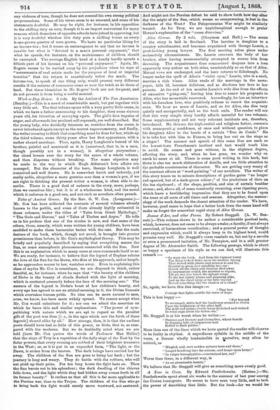Tales of Ancient Greece. By the Rev. G. W. Cox.
(Longmans.)— Mr. Cox has here collected the contents of several volumes already known to the public, and some of them already highly estimated in these columns, under the titles of "Tales from Greek Mythology," "The Gods and Heroes," and "Tales of Thebes and Argos." He tells us in his preface that one of the stories is new, and that some of the others, those, namely, which were written for young children, have been modified to make them harmonize better with the rest. But the main feature of the book, which, though not novel, is brought into greater prominence than before, is Mr. Cox's mythological theory. This may be briefly and popularly described by saying that everything means the Sun, or some atmospheric phenomenon connected with the Sun. Now this is an explanation which in many cases at once commends itself to us. We are ready, for instance, to believe that the legend of Daphne relates the love of the Sun for the Dawn, who flies at his approach, and at length, as he approaches nearer to her, vanishes away. Even in explaining this class of myths Mr. Cox is sometimes, we are disposed to think, rather fanciful, as, for instance, when he says that "the beauty of the children of Niobe is the beauty of clouds flushed with the light of morning, which is scattered presently before the face of the morning sun." The essence of the legend is Niel:es boast of her children's beauty, and every age has agreed to see an ethical meaning in it, the Divine Nemesis which overtakes human pride. No idea can be more natural to men, _none, we know, has been more widely spread. We cannot accept what Mr. Cox would substitute for it ; nor can we admit the assertion on which he bases this and similar explanations. "The power of sym- pathizing with nature which we are apt to regard as the peculiar gift of the poet was then [i. e., in the ages which saw the birth of these legends] shared alike by all." How strange, then, it is that the earliest poets should have had so little of this power, so little, that is, as com- pared with the moderns. But we do decidedly rebel when we are told (here Mr. Cox quotes the words of Professor Max Muller) that the siege of Troy is a repetition of the daily siege of the East by the Solar powers, that every evening are robbed of their brightest treasures in the West ; or, as it is put in an expanded form, "The light, or the Dawn, is stolen from the heaven. The dark beings have carried her far away. The children of the Sun are gone to bring her back ; but the journey is long and weary. They do battle with the robbers, who will o t yield up their prize. For ten long hours the fight lasts on. Then the Sun bursts out in his splendour; the dark dwelling of the thieves falls down, and the light which they had hidden away comes forth in all its former beauty." It strikes us that all this is far more applicable to the Persian war, than to the Trojan. The children of the Sun who go to bring back the light would surely move westward, not eastward. And might not the Persian defeat be said to show forth how day after day the might of the San, -which seems so overpowering, is lost in the darkness of the West ? The Peloponnesian War might be similarly treated. As for Troy, we are nnphilosophical enough to prefer Horace's explanation of the "cause detsrrima."






























 Previous page
Previous page